
Known for its mesmerising health benefits, loved for its bounty of natural flavours, the Mediterranean diet has become world-famous. And rightly so! Our homegrown cuisine stands the test of time, and has even been immortalised as a treasure of humanity…
It was a December morning in 2013 when it became official. The Mediterranean diet, that time-honoured tradition of olive oil, wine and gorgeous greens, would forever be remembered as “the intangible cultural heritage of humanity”. A bit of a mouthful to say, but an important honour.
The decision came from UNESCO (United Nations Educational, Scientific and Cultural Organization) who had assembled delegates of over 100 nation states to determine what should go on their new list. A list of iconic traditions and techniques, ideas that have helped humanity grow, thrive and do wonderful things. Naturally, it all starts with a good meal.
“Eating together is the foundation of our cultural identity,” began the diet’s nomination. “It is a moment of social exchange and communication, an affirmation and renewal of family, group or community identity. The Mediterranean diet emphasizes values of hospitality, neighbourliness, intercultural dialogue and creativity, and a way of life guided by respect for diversity.”
Our diet is more than just an aspirational way of eating. It’s a way of life. And now it’s recognised as one humanity’s greatest ideas. What better reason to choose a quinoa salad?
From local favourite to global phenomenon
Today, when most people think of the Mediterranean diet, it’s the Cretan diet that really comes to mind. That’s largely thanks to a scientific study that began in the 1960s, which looked at the relationship between lifestyle and health. When the researchers studied the humble farmers of Crete, what they found catapulted greens and beans into cookbooks for years to come.
Initially, the results were surprising. Despite being one of the poorest populations in the study, the people of Crete were by far the healthiest. Almost no heart disease or cancer in sight, and that was only the beginning. By the 1990s, when participants were aged 70 to 90, only the Cretans were left. Thanks to their diet and lifestyle, they had outlived every other group.
News travels fast. The Mediterranean diet was making headlines. The rest of the world wanted in. And although the original study had already made fans of what they eat in Crete, the 90s follow-up shot it to stardom. Of course, a ‘Mediterranean’ diet is a catchier and more recognisable name, so that’s what stuck. But don’t call it that here! Cretans are proud of their island lifestyle, inviting friends and strangers alike to share a meal and listen to the story of a tradition’s rise to fame.
Healthy humans, healthy planet
The Cretans have it right. According to recently published evidence by the Harvard School of Public Health, the Mediterranean diet has countless positive effects, including:
- Risk of heart disease reduced by 25%
- Risk of a fatal stroke reduced by 30%
- Likelihood of ageing healthily increased by 46%
Our incredible edibles have even been found to preserve our DNA. For humans, it’s a no-brainer. And for the planet, the news is just as good…
Diane Kochilas is an award-winning Greek gastronomy expert and a native of Ikaria, a Greek ‘Blue Zone’ island famed for its long-lived population. She suggests three reasons why the Mediterranean diet is “not only good for our bodies, it’s also best for the planet”:
- Locally sourced, organic, plant-based ingredients
- Less meat, more beans
- Letting nothing go to waste
While the first two reasons are self-explanatory, the third reason is where the Mediterranean diet starts to show off. In times of necessity, as was the case with the Cretan farmers, letting nothing go to waste was essential, so humanity’s knack for creativity and innovation had to kick in.
“Letting nothing go to waste has been an age-long practice in Greece because food was precious,” Diane explains. “This approach led to the creation of foods like trachanas, a pasta-like grain used to preserve sour milk, and kokkoretsi, an Easter sausage of lamb or goat offal.”
Bringing this no-waste approach into modern Mediterranean cooking, Diane’s 18 books on the topic feature many ‘nose-to-tail’ cooking methods we can all adopt, such as her Broccoli Stalk Slaw and Stuffed Potato Skins recipes. Of course, in both Crete and Ikaria, it’s easier to pluck every ingredient from the back garden than it is in more cosmopolitan parts of the world, but we can still make the most of what we do have with a little creativity.
Let your tastebuds be the judge
Whether it’s the allure of UNESCO-approved world history, the promise of a healthier body and mind, or even the hope for saving our planet, the Mediterranean diet is for everyone. And you don’t even need to travel the world for it.
Follow Diane’s recipes yourself for a taste of the Med at home. Track down your local Greek restaurants for a little more authenticity. Or join us at our table in Greece. Not only do we know the best places to eat in Crete, Diane Kochilas herself even whipped up a specialist menu for us. And after all this talk of kokkoretsi and quinoa, the kitchen is calling. Kali orexi!

 Santorini
Santorini 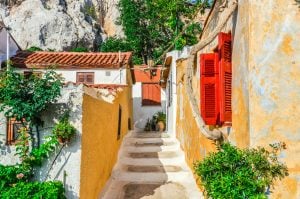 Athens
Athens 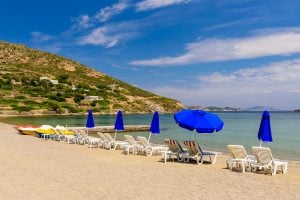 Patmos
Patmos 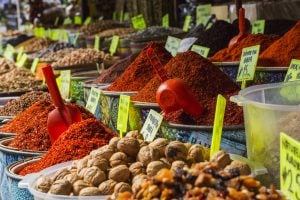 Istanbul
Istanbul 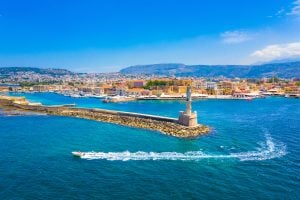 Crete
Crete 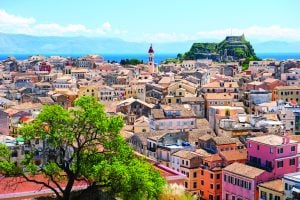 Corfu
Corfu 






 Deutschland (€)
Deutschland (€)
 Turkey (€)
Turkey (€)
